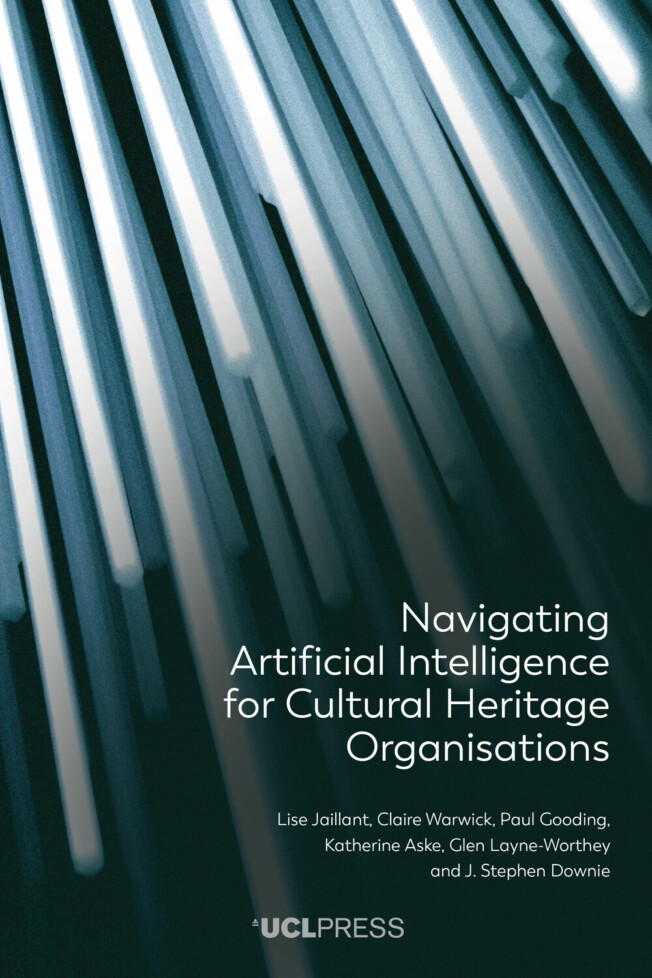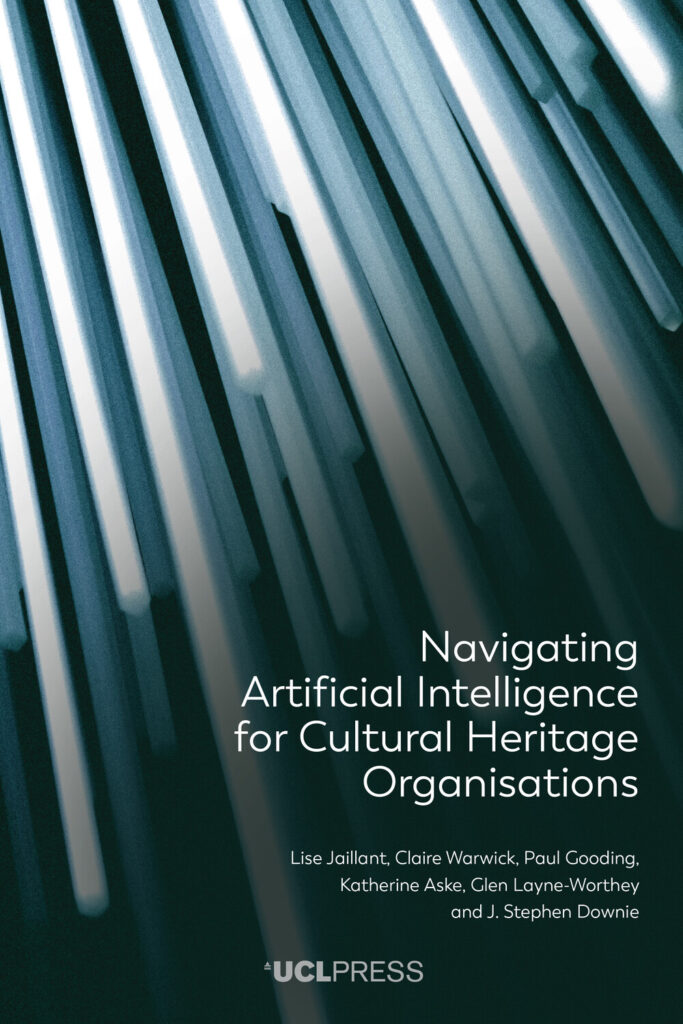
Navigating Artificial Intelligence for Cultural Heritage Organisations
Lise Jaillant (Editor), Claire Warwick (Editor), Paul Gooding (Editor), Katherine Aske (Editor), Glen Layne-Worthey (Editor), J. Stephen Downie (Editor)
The question of how artificial intelligence and machine learning should be applied to data in libraries and other cultural institutions is a challenge shared by heritage professionals, computer scientists and digital humanities scholars.
As the number of digitised and born-digital records grows, archival practices are looking to automated systems to manage workloads and make cultural records more accessible. AI is playing a crucial role in data management systems within the cultural heritage sector, and information professionals are looking for ways to navigate current challenges and opportunities. Additionally, sector professionals and scholars are benefiting from the many new affordances and innovative research questions offered by using large-scale digital collections as data.
Navigating Artificial Intelligence for Cultural Heritage Organisations explores the innovative technologies and approaches to digitised and born-digital records within libraries and archives across the UK and US, and beyond. It brings together chapters from experts across the fields of digital humanities, computer science and information science, alongside professionals within the library and archival sector. The authors explore technologies being applied to digitised and born-digital records within libraries, archives and other heritage organisations, including innovative approaches in computer vision, Chat GPT, and user experience. The volume has been designed to reflect current and state-of-the-art technologies and innovations for the preservation and accessibility of digitised and born-digital records, to help navigate the future of AI for cultural heritage organisations.
List of figures
List of tables
Glossary
List of contributors
Acknowledgements
Introduction
Lise Jaillant, Claire Warwick, Paul Gooding, Katherine Aske, Glen Layne-Worthey and J. Stephen Downie
Part I: The role of AI in preserving and making accessible digitised and born-digital records
1 The National Archives (UK)
Lise Jaillant, Katherine Aske and Annalina Caputo
2 Computer vision and cultural heritage
Catherine Nicole Coleman
3 Machine learning at the National Library of Norway
Javier de la Rosa
Part II: Text and beyond: AI applied to text, images and audio-visual archives
4 From preservation to access and beyond: the Role of AI in audio-visual archives
Julia Noordegraaf and Anna Schjøtt Hansen
5 Digital mapping and cultural heritage
Claire Warwick and Katherine Aske
6 Making more sense with machines: artificial intelligence at the HathiTrust Research Center
Glen Layne-Worthey, J. Stephen Downie, Janet Swatscheno, Nikolaus Parulian, Jill Naiman, Ben Schmidt, Peter Organisciak, Ted Underwood, and Ryan Dubnicek
Part III: Digitised collections and hand-written text: challenges and new methods
7 Distant viewing archives
Lauren Tilton and Taylor Arnold
8 The adoption of handwritten text recognition at the National Library of Scotland
Paul Gooding, Joseph Nockels and Melissa Terras
9 Conversing with the past: re-examining the legacy of slavery in domestic traffic newspaper advertisements with OpenAI’s advanced LLM
Rajesh Kumar Gnanasekaran, Christopher E. Haley and Richard Marciano
10 Afterword: An emergence from winter or summer may be upon us Thomas Padilla
Index
DOI: 10.14324/111.9781800088375
Number of illustrations: 41
Publication date: 12 June 2025
PDF ISBN: 9781800088375
EPUB ISBN: 9781800088382
Read Online ISBN: 9781800088375
Hardback ISBN: 9781800088351
Paperback ISBN: 9781800088368
Lise Jaillant (Editor)
Lise Jaillant is Professor of Digital Cultural Heritage at Loughborough University.
Claire Warwick (Editor)
Claire Warwick is Professor of Digital Humanities in the Department of English at Durham University.
Paul Gooding (Editor)
Paul Gooding is Professor of Library Studies and Digital Scholarship at the University of Glasgow.
Katherine Aske (Editor)
Katherine Aske is a Lecturer in English at Edinburgh Napier University.
Glen Layne-Worthey (Editor)
Glen Layne-Worthey is Associate Director for Research Support Services, HathiTrust Research Center, University of Illinois Urbana-Champaign.
J. Stephen Downie (Editor)
J. Stephen Downie is Associate Dean for Research and a Professor at the School of Information Sciences, and the Illinois Co-Director of the HathiTrust Research Center at the University of Illinois Urbana-Champaign.
‘It’s hard to avoid hype about AI: much harder to find practical experience. This volume puts that right with thoughtful examples rooted in the genuine challenges and opportunities faced by cultural institutions managing, preserving and sharing their burgeoning digital collections.’
William Kilbride, Digital Preservation Coalition
‘This volume stands as a comprehensive, critically reflective and timely exploration of AI’s role in cultural heritage, and an indispensable resource for teaching and learning.’
Victoria Lemieux, University of British Columbia, Vancouver
‘A serious work by international authors presenting state-of-the art AI solutions for preserving and accessing born-digital and digitised records in cultural heritage organisations. This profoundly important volume should be read by members of the library and archival professions everywhere.’
Jason R. Baron, University of Maryland
Navigating Artificial Intelligence for Cultural Heritage Organisations
Lise Jaillant, Claire Warwick, Paul Gooding, Katherine Aske, Glen Layne-Worthey, J. Stephen Downie,
12 June 2025
Rethinking the Andes–Amazonia Divide
Adrian J. Pearce, David G. Beresford-Jones, Paul Heggarty,
21 October 2020
Water Societies and Technologies from the Past and Present
Mark Altaweel, Yijie Zhuang,
26 November 2018
Navigating Artificial Intelligence for Cultural Heritage Organisations
The question of how artificial intelligence and machine learning should be applied to data in libraries and other cultural institutions is a challenge shared by heritage professionals, computer scientists and digital humanities scholars.
As the number of digitised and born-digital records grows, archival practices are looking to automated systems to manage workloads and make cultural records more accessible. AI is playing a crucial role in data management systems within the cultural heritage sector, and information professionals are looking for ways to navigate current challenges and opportunities. Additionally, sector professionals and scholars are benefiting from the many new affordances and innovative research questions offered by using large-scale digital collections as data.
Navigating Artificial Intelligence for Cultural Heritage Organisations explores the innovative technologies and approaches to digitised and born-digital records within libraries and archives across the UK and US, and beyond. It brings together chapters from experts across the fields of digital humanities, computer science and information science, alongside professionals within the library and archival sector. The authors explore technologies being applied to digitised and born-digital records within libraries, archives and other heritage organisations, including innovative approaches in computer vision, Chat GPT, and user experience. The volume has been designed to reflect current and state-of-the-art technologies and innovations for the preservation and accessibility of digitised and born-digital records, to help navigate the future of AI for cultural heritage organisations.
‘It’s hard to avoid hype about AI: much harder to find practical experience. This volume puts that right with thoughtful examples rooted in the genuine challenges and opportunities faced by cultural institutions managing, preserving and sharing their burgeoning digital collections.’
William Kilbride, Digital Preservation Coalition
‘This volume stands as a comprehensive, critically reflective and timely exploration of AI’s role in cultural heritage, and an indispensable resource for teaching and learning.’
Victoria Lemieux, University of British Columbia, Vancouver
‘A serious work by international authors presenting state-of-the art AI solutions for preserving and accessing born-digital and digitised records in cultural heritage organisations. This profoundly important volume should be read by members of the library and archival professions everywhere.’
Jason R. Baron, University of Maryland

